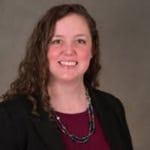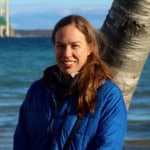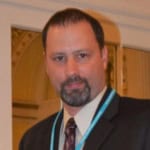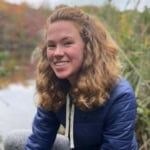Speakers
Topic: HAB (Harmful Algal Blooms) Research Update
 Courtney Wigdahl-Perry, Ph.D.
Courtney Wigdahl-Perry, Ph.D.
State University of New York at Fredonia, associate professor of biology
Dr. Courtney Wigdahl-Perry is an Associate Professor of Biology at the State University of New York at Fredonia, She earned her Ph.D. in Ecology and Environmental Sciences from the University of Maine in 2012. As an aquatic ecologist, Dr. Wigdahl-Perry’s research program centers around understanding how lakes respond to environmental change. She works on local lakes in western New York as well as other systems around the world, primarily focusing on algae communities and water quality issues. Her research interests span different timescales, using field sampling techniques and high-frequency sensors to study lakes today, as well as studying biological fossils preserved within lake sediments to explore the past history of lakes.”
Topic: Jefferson Project on Chautauqua Lake Research Update
 Harry Kolar, Ph.D.
Harry Kolar, Ph.D.
IBM Fellow with IBM Research, focused on environmental monitoring and management
Dr. Harry Kolar is an IBM Fellow with IBM Research, focused on environmental monitoring and management. Dr. Kolar currently leads a multidisciplinary team of IBM researchers in the environmental sciences domain and is the Associate Director of The Jefferson Project. Dr. Kolar holds B.S. and M.S. degrees in physics and an interdisciplinary Ph.D. in the science and engineering of materials.
 Allison Hrycik, Ph.D.
Allison Hrycik, Ph.D.
Renssalaer Polytechnic Institute, research scientist
Dr. Allison Hrycik is a research scientist for the Jefferson Project, and is based locally to research harmful algal blooms on Chautauqua Lake. She is originally from Colden, NY and holds a PhD in Biology from University of Vermont. During her PhD, she studied how changing winter conditions help set the stage for algae blooms during the open water season. Her current projects include monitoring lake bottom algae, and understanding nutrient inputs from the Chautauqua Lake watershed.
Topic: NCSU’s Submerged Aquatic Vegetation Survey of Chautauqua Lake
 Rob Richardson, Ph.D.
Rob Richardson, Ph.D.
North Carolina State University (NCSU), Aquatic and Non-Cropland Weed Scientist in the Department of Crop Science
Dr. Rob Richardson’s appointment as North Carolina State University Aquatic and Non-Cropland Weed Scientist in the Department of Crop Science is 60% research and 40% extension. The primary responsibility of this position is aquatic weed management and the secondary responsibility is invasive plant management in non-cropland. This position is critical for development of integrated and sustainable weed management programs for reservoirs, lakes, ponds, other bodies of water, and non-cropland in North Carolina and the surrounding region. Vegetation on these sites must be managed in an environmentally sound manner to improve or maintain fish and wildlife habitat, improve biological diversity, and reduce the size and scope of alien plant invasions.
Topic: SUNY Oneonta’s Chautauqua Lake Macrophyte Survey
 Claire McMahon
Claire McMahon
SUNY Oneonta, master’s student
Claire McMahon is a master’s student at SUNY Oneonta studying Lake Management. She has a bachelor’s degree in Environmental Sustainability from SUNY Oneonta and four years of experience in habitat restoration, aquatic and terrestrial invasive species management, and environmental education. Claire is spending the summer as a Watercraft Inspection Steward Team Lead for the Catskill Regional Invasive Species Partnership.
Schedule
Each speaker will have 20 minutes to present and 10 minutes of Q-and-A.
8 a.m. • Registration and coffee
9 a.m. • Introduction – Michael Hill, Ed.D., Chautauqua Institution President
9:15–9:45 a.m. • 30 min presentation and Q-and-A
- Courtney Wigdahl-Perry, Ph.D. – SUNY Fredonia
- Topic: HAB (Harmful Algal Blooms) Research Update
9:45–10:15 a.m. • 30 min presentation and Q-and-A
- Harry Kolar,Ph.D. – IBM (remote)
- Allison Hrycik, Ph.D. – Renssalaer Polytechnic Institute
- Topic: Jefferson Project on Chautauqua Lake Research update
10:15 a.m. • Break
10:30–11 a.m. • Table time from Lake Organizations
- This is a time for conference attendees to learn about what the lake organizations do and an opportunity to learn how to get involved in conservation.
11:15–11:45 a.m. •30 min presentation and Q-and-A
- Claire McMahon – SUNY Oneonta
- Melanie Rooney – SUNY Oneonta
- Topic: SUNY Oneonta’s Chautauqua Lake Macrophyte Survey
11:45–12:15 p.m. •Networking Opportunity. Chance to speak to lake groups.
12:15 p.m. • Conference Conclusion
Presenting Lake Organizations
For our 2024 Lake Conference, we are honored to have participation from several local organizations working hard to improve the health of Chautauqua Lake. Conference attendees will have the opportunity to meet members of these organizations to understand better what each does for the lake and its watershed and get some ideas for getting more involved in lake conservation. The following organizations will have tables set up at the conference:
Chautauqua-Conewango Consortium
